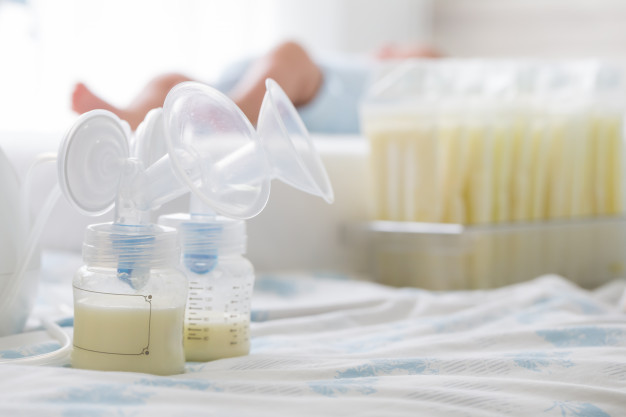 Breastfeeding is generally considered to be the best option to ensure babies get the necessary level of nutrition they need to stay happy and healthy. It’s considered the most natural thing in the world, yet as many new moms have discovered, it’s not always as easy as it looks.
Breastfeeding is generally considered to be the best option to ensure babies get the necessary level of nutrition they need to stay happy and healthy. It’s considered the most natural thing in the world, yet as many new moms have discovered, it’s not always as easy as it looks.
All kinds of problems can occur when it comes to breastfeeding your baby and one of the most upsetting and frustrating is a low milk supply. It can feel like your body is betraying you. This is the one thing you’re supposed to be able to do as a mother, so why can’t you give your baby what they need?
The first thing to understand is that this is actually a very common problem. It’s something many new moms experience and the good news is there are ways to boost the amount of milk your body is producing. So, if you’re worried you aren’t producing enough milk to feed your little one, below you’ll discover 10 great tips to naturally boost your milk supply.
1. Start With Your Diet
 Diet plays a huge part in your body’s overall health, but did you know it can also impact your breast milk supply? What you eat can determine how much, or how little milk your body produces. So, if you’re looking to boost your milk production, there are a few foods you’ll want to focus on including:
Diet plays a huge part in your body’s overall health, but did you know it can also impact your breast milk supply? What you eat can determine how much, or how little milk your body produces. So, if you’re looking to boost your milk production, there are a few foods you’ll want to focus on including:
- Fennel seeds
- Green, leafy vegetables
- Protein rich foods
Fennel seeds may sound like a strange one, but they’re actually a very traditional remedy frequently used to aid in milk production in nursing mothers. Not only are they said to increase the amount of milk you produce, but they’re also said to prevent babies from developing colic and gas. It’s important to note there isn’t any scientific research to back up these claims, but many parents have testified to the fact that they have helped their little ones.
Green leafy vegetables are another powerful thing to add to your diet. As well as enhancing lactation, these leafy vegetables, particularly spinach, are also thought to be a rich source of calcium, iron, and other essential vitamins. It’s recommended you eat one or two portions each day to experience their full benefits.
It is estimated that breastfeeding women need at least 70g of protein a day, compared to non-breastfeeding women who only need around 40g. So, if your diet is lacking in protein it could cause lactation issues. Some women even recommend drinking protein shakes as it helps to encourage an increased milk supply; especially if you’re pumping frequently too.
2. Drink Water When You’re Thirsty
You may have already read that water is good for increasing milk supply. This is actually a myth. So why is it included on the list? Because it’s still important for your milk production to drink when you’re thirsty. Your body naturally needs a certain level of water to function correctly. Therefore, if you’re not drinking enough it can lead to numerous health issues and decreased lactation is one of them.
So, while drinking more than you need isn’t going to help increase milk production, ensuring you drink enough is going to ensure you’re at least producing as much milk as you should be.
3. Check If Baby Is Feeding Properly
 Did you know that if your little one isn’t latching on and drinking properly it can lead to lower milk production? If they aren’t feeding properly, the milk won’t be transferring properly and this will lead to problems not just with milk production, but they also won’t be getting the nutrition they need.
Did you know that if your little one isn’t latching on and drinking properly it can lead to lower milk production? If they aren’t feeding properly, the milk won’t be transferring properly and this will lead to problems not just with milk production, but they also won’t be getting the nutrition they need.
A good way to understand the issue is to think of a swimming pool. Then imagine trying to drain all of the water from the pool using a straw. It will work eventually, but it’s going to take a very long time! That’s exactly what happens if baby isn’t feeding properly from the breast.
If you’re unsure whether your little one is feeding correctly, seek advice from a doctor or pediatrician. You can also try out different feeding positions to see if that helps. In the meantime, use a breast pump to ensure the milk is drained from the breast efficiently until the problem can be addressed.
4. Minimize Stress
Stress can cause havoc for the body and it could be the reason behind your lactating troubles. Becoming a new mom is stressful. You suddenly need to adjust to having very little sleep and there never seems to be enough hours in the day to get everything done. The sheer exhaustion that comes with parenthood is enough to make you feel like you’re going insane.
If you’re experiencing excessive stress, it could be compromising your milk supply. Therefore, it’s important to try to get as much “you” time as possible. Ask friends and relatives to look after your little one, even for just a few hours when you’re feeling overly stressed out. Taking the time to look after yourself will not only help ensure you have a regular supply of milk, but it also benefits baby. Remember, when you’re stressed out your baby becomes stressed, making it much more difficult to console them. So, take time for you, relax and put yourself first every now and again, it really will make all the difference to you and your little one.
5. Pump Frequently
 If you don’t already pump your breastmilk, it’s recommended you start. Many new moms have experienced the dreaded “enlarged breast effect” which occurs if they miss a pumping session. If baby isn’t feeding frequently enough, the breasts will fill with milk. This doesn’t just make them bigger, it makes them uncomfortable too.
If you don’t already pump your breastmilk, it’s recommended you start. Many new moms have experienced the dreaded “enlarged breast effect” which occurs if they miss a pumping session. If baby isn’t feeding frequently enough, the breasts will fill with milk. This doesn’t just make them bigger, it makes them uncomfortable too.
You’d naturally assume pumping the breast milk will diminish the amount available. However, what it actually does is increase the milk supply. Once the breasts are empty, it signals to body to produce more. So, regularly pumping will ensure you have an endless supply of milk.
Pumping directly after a feed or in-between feeds is advised. You should also continue to pump for around 2-5 minutes after the last bit of milk has been pumped out as this will speed up the milk production process.
Breastmilk pumps are pretty cheap on Amazon and we’ll be coming out with one of our own soon, so it’s worth picking one up.
6. Don’t Limit Feeds
A good rule of thumb is to feed your baby as frequently as they want. If you’re following a parent-led routine, you may currently be restricting feeds to certain time periods. While this can help maintain a set schedule and reduce several issues such as sleeping troubles, it can have a negative impact on your milk supply.
Letting baby feed as frequently as they want to will naturally encourage healthy milk production. As mentioned earlier, if you allow the milk to build up, it can actually slow down the production rate, signaling to the body that you don’t need any more milk. So, encourage your baby to nurse frequently and see if this helps to increase your milk supply.
7. Massage The Breasts
 This will not increase milk production, but it will aid with other potential breastfeeding issues such as blocked ducts. If you suffer with blocked milk ducts, this will limit the amount of milk which gets through during breastfeeding. In turn, this can indirectly cause the body to produce less milk as the current supply isn’t used up quickly enough.
This will not increase milk production, but it will aid with other potential breastfeeding issues such as blocked ducts. If you suffer with blocked milk ducts, this will limit the amount of milk which gets through during breastfeeding. In turn, this can indirectly cause the body to produce less milk as the current supply isn’t used up quickly enough.
When massaging the breasts, make sure you’re doing it gently. If you massage them too roughly, you could end up damaging the ducts and this will lead to further issues will milk production.
8. Avoid Overusing Pacifiers, Food And Bottles
Another great tip is to avoid overusing pacifiers, food and bottles. The odd bottle feed shouldn’t cause any problems, but if you frequently use a bottle or pacifier, it could lead to what is referred to as “nipple confusion”. This reduces your baby’s ability to feed properly from the breast and in turn can lead to problems with milk supply.
These things can also reduce your baby’s hunger, making them a lot less likely to want to nurse frequently. Solid foods in particular should be avoided until your little one is at least six months old, though it’s best to seek advice from your doctor.
9. Switch Breasts
 If you don’t already, it’s worth starting to nurse from both breasts during the same feed. Once baby has finished nursing from one breast, offer them the other. If you find they are either too full or sleepy before they move onto the second breast, switch after a few minutes, rather than waiting for them to finish.
If you don’t already, it’s worth starting to nurse from both breasts during the same feed. Once baby has finished nursing from one breast, offer them the other. If you find they are either too full or sleepy before they move onto the second breast, switch after a few minutes, rather than waiting for them to finish.
Draining both breasts will really boost milk production. You can also try the double feed method. This includes feeding baby on one breast, burping them and then feeding them on the other breast. Burping will release any gas build-up and make space for an additional feed.
10. Ask Your Doctor About Herbal Remedies
Did you know there are herbal remedies available to help boost milk production? Even though herbal remedies are considered “safe”, it’s still important to check with your doctor before taking them. Some supplements, especially one’s bought online, may not be as safe or as effective as you think. Therefore, it’s best to ask a doctor which ones they recommend. They will have a list of FDA approved remedies at their disposal.
It could be herbal remedies aren’t enough to boost your milk production levels. You may instead need medication which your doctor will prescribe.
Conclusion
Overall, it can be distressing to find you aren’t producing enough milk. It’s also important to note that you may not have a problem at all. Never assume anything, always check with a doctor to see whether there is a problem before you attempt to treat it!
Have you experienced any problems breastfeeding your little one? Let us know what helped your milk production below!
In Philippines, it is highly recommended to take MORINGA one month before your expected dated of confinement or EDC. It is scientifically proven that moringa helps in production of milk. Calcium intake aside from green leafy vegetables is a must. So I agree, everything comes in your diet. Mothers are encourage to massage their breast before feeding the baby in this way the production of milk is more better, it is best when you massage with warm towel. If you cannot breastfeed make sure you pump otherwise you will experience MASTITIS or inflammation of the mammary gland. Drinking warm soup, relaxed mind and good ambiance makes more comfortable place for mothers and babies.
I have a pregnant friend who would probably give birth in a month time, I do believe that the information contained herein on how to boast production of breast milk is going to be very useful for her in case she is unfortunate to having difficulty in producing enough breast milk for her new baby. I know about taking lots of liquids to help with milk production but from this article, I have learnt that there several more ways to help with it.